Economy Wails; Congress Flails « The Washington Independent
Jul 31, 2020130.2K Shares1.7M Views
Rep. Mike Pence (WDCpix)
Responding to the nation’s economic crisis, Washington policymakers are experiencing a meltdown of their own.
As Wall Street fluctuated erratically, congressional leaders on Friday resumed efforts to hash out a compromise plan to bailout the ailing financial system after negotiations broke down late the night before. Key lawmakers continued to claim progress.
But there was no indication that House Republicans, who say the administration’s $700 billion blueprint goes too far to interfere in the private marketplace, are ready to drop their opposition. Some equate the plan with socialism.
Illustration by: Matt Mahurin
“To have the freedom to succeed,” Rep. Mike Pence (R-Ind.) said in a statement, “we must also have the freedom to fail, and any solution to the present crisis must preserve that essential economic liberty.”
Bolstering the Republicans’ case, voters have bombardedtheir lawmakers with calls and emails in recent days, demanding that Wall Street bear some responsibility for the crisis it created.
Hoping to calm jittery markets and an outraged public, President George W. Bush made a brief statementFriday morning from the White House, calling for quick approval of what he considers a vital rescue plan.
“There are disagreements over aspects of the rescue plan,” Bush said, “but there is no disagreement that something substantial must be done.” Bush vowed that lawmakers “will rise to the occasion.”
Adding to the urgency, federal regulators on Thursday seized debt-laden Washington Mutual, the largest bank failure in the country’s history.
Under the White House plan, drawn up last week by Treasury Sec. Henry Paulson Jr., the government would spend up to $700 billion in taxpayer funds to buy up the toxic, mortgage-based securities accumulated in the country’s banks and financial institutions, that are clogging the free flow of credit nationwide. Paulson and Federal Reserve Chairman Ben Bernanke spent much of the week on Capitol Hill trying to sell their plan to a highly skeptical Congress, claiming that inaction could end in economic meltdown.
None are so skeptical as House Republicans, who have drafted their own plan requiring troubled banks and Wall Street firms to insure their tainted investments through premiums paid to the Treasury. The GOP plan also eliminates the capital gains tax for two years.
“We want voluntary investor capital, not involuntary taxpayer capital to come in and help solve these problems,” Rep. Jeb Hensarling (Texas), chairman of the conservative Republican Study Committee, tolda Texas TV station.
In a Sept. 26 letterto House Speaker Nancy Pelosi (D-Cal.), House Minority Leader John Boehner (R-Ohio) warned that, unless the GOP alternative is given “serious consideration” during negotiations, “a large majority of Republicans cannot — and will not — support Sec. Paulson’s plan.” As a sign of some progress, House Minority Whip Roy Blunt (R-Mo.) joined the negotiations Friday.
Democrats have made it clear that they support the basic framework of Paulson’s plan, but have no intention of voting for it without GOP support. Democrats are also pushing for a number of consumer-friendly provisions, including more help for struggling homeowners and bolstered oversight of the Treasury’s debt-buying efforts.
Senate Republicans have joined Democrats in calling for more taxpayer protections. The powers given to the Treasury to administer the program, critics say, are both too sweeping and too vague. As some indication of how vague the Paulson plan is, the Congressional Budget Office, the nonpartisan group charged with estimating the cost of legislation, couldn’t fathom a guess.
“The Secretary,” the CBO wrote, “would have the authority to purchase virtually any asset, at any price, and sell it at any future date; the lack of specificity regarding how that authority would be implemented makes it impossible at this point to provide a quantitative analysis of the net cost to the federal government.”
Debate over how to tackle the financial turmoil has swept into the presidential race. GOP hopeful Sen. John McCain (Ariz.) shocked the country Wednesday by stalling his campaign to visit Washington in search of a compromise.
Democrats, including party nominee Sen. Barack Obama (Ill.), pounced on that decision, calling it politically opportunistic. Some said McCain’s intervention helped sink the progress negotiators had made Thursday.
“His position in that discussion yesterday was one that stopped a deal from finalizing,” Blunt said.

Rhyley Carney
Reviewer
Latest Articles
Popular Articles

